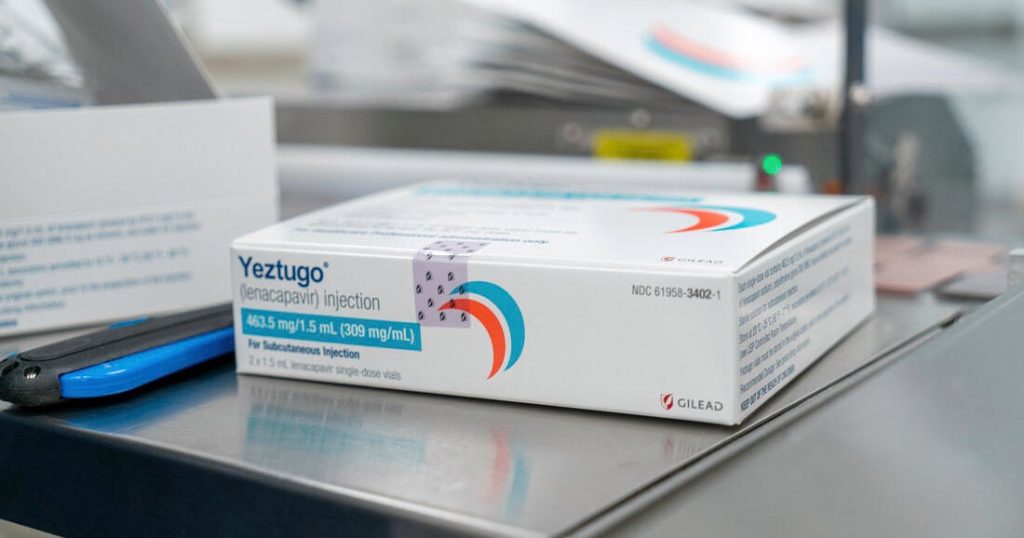The U.S. Food and Drug Administration (FDA) has recently sanctioned lenacapavir, marketed as Yeztugo, as a bi-annual injection aimed at preventing HIV infection. The approval was predicated on compelling clinical trial results, indicating a remarkable 99.9% efficacy in keeping participants HIV-negative. Gilead Sciences, the manufacturer, heralded this milestone as a transformative step in combating the HIV epidemic, even as concerns loom regarding the halt of funding for HIV vaccine research.
| Article Subheadings |
|---|
| 1) FDA Approval of Lenacapavir |
| 2) Implications for the HIV Epidemic |
| 3) Vaccine Research Under Threat |
| 4) Expert Insights on Vaccine Development |
| 5) Broader Context of HIV Research Funding |
FDA Approval of Lenacapavir
On Wednesday, the FDA granted approval for lenacapavir, a drug developed by Gilead Sciences, as a preventive treatment against HIV. This prescription medication, administered as an injection twice a year, is seen as a significant breakthrough in the fight against the HIV epidemic. Clinical trials supporting the approval demonstrated that 99.9% of participants who received lenacapavir remained HIV negative. The approval was influenced by robust data, emphasizing its potency and the potential to dramatically reduce new HIV infections.
Implications for the HIV Epidemic
According to recent findings from the Centers for Disease Control and Prevention (CDC), the United States recorded an estimated 31,800 new HIV infections in 2022—a worrying statistic that underscores the ongoing challenge posed by this virus. The approval of lenacapavir is anticipated to be a game-changer, with health officials calling it a major step toward controlling transmission rates. Daniel O’Day, Gilead’s CEO, characterized the decision as a “milestone moment in the decades-long fight against HIV.” His comments underscore the transformative potential of this new drug in shifting the narrative on HIV prevention.
Vaccine Research Under Threat
Despite the remarkable advancement marked by the approval of lenacapavir, there are escalating concerns about the future of HIV vaccine research. The current administration has proposed significant funding cuts to various HIV vaccine initiatives, arguing that available treatments, including lenacapavir, are sufficient. Critics of this decision contend that halting support for vaccine research is perilous, raising alarms about the prospect of a long-term solution to HIV prevention.
Expert Insights on Vaccine Development
Experts in the field have expressed mixed feelings about the approval of lenacapavir amid funding cuts to vaccine research. Dr. Barton Ford Haynes, the director of the Duke Human Vaccine Institute, described lenacapavir as a “wonderful development,” yet emphasized that the pursuit of an HIV vaccine remains critically important.
“This is a terrible time to cut it off. We’re beginning to get close. We’re getting good results out of clinical trials,”
said Dennis Burton, an immunology professor at Scripps Research. His sentiments reflect the urgency for continued investment in vaccine research to complement newly approved treatments.
Broader Context of HIV Research Funding
The decision to cut funding for HIV vaccine research could have far-reaching implications, hindering progress potentially for a decade. Dennis Burton cautioned that various ongoing experiments and studies could be disrupted, as research teams might be forced to pivot to unrelated areas. His comments indicate a growing concern that the short-sighted cuts to funding may stall crucial advancements in the realm of HIV vaccine development. Research on effective vaccines has seen promising leads in recent years, and the abandonment of these initiatives could have detrimental consequences in the public health landscape.
| No. | Key Points |
|---|---|
| 1 | FDA approved lenacapavir as a bi-annual injection for HIV prevention. |
| 2 | 99.9% of participants in clinical trials remained HIV negative after taking the drug. |
| 3 | 31,800 new HIV infections were reported in the U.S. in 2022. |
| 4 | Concerns grow regarding cuts to HIV vaccine research funding. |
| 5 | Experts emphasize the need to continue pursuing HIV vaccine development. |
Summary
The FDA’s approval of lenacapavir marks a pivotal moment in the ongoing battle against HIV. With its high efficacy rate and the potential to curb new infections, it represents a significant advancement in treatment options. However, the concurrent threats to vaccine research funding pose serious challenges that could limit future progress. The dual-track approach of treatment and vaccine development remains essential in efforts to end the HIV epidemic once and for all.
Frequently Asked Questions
Question: What is lenacapavir?
Lenacapavir, marketed as Yeztugo, is a prescription medication approved by the FDA for the prevention of HIV, administered as a bi-annual injection. Clinical trials show it has a 99.9% effectiveness rate.
Question: What are the implications of the FDA’s approval of lenacapavir?
The approval is seen as a monumental step in HIV prevention, offering a new option for individuals at risk of infection and potentially reducing new case rates significantly.
Question: Why is there concern about cuts to vaccine research funding?
Cuts to vaccine research funding jeopardize ongoing studies and discourage advancements in developing a vaccine to combat HIV, which many experts believe is crucial alongside existing treatment methods.


